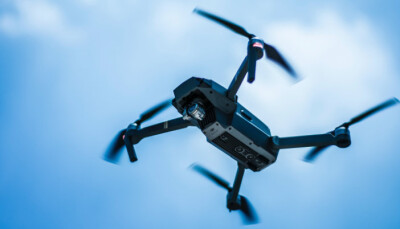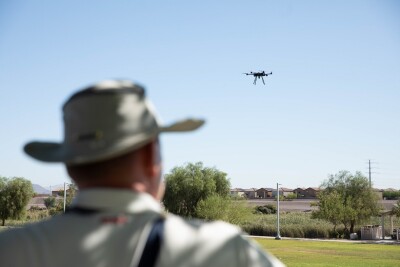When most of us think of jobs in the commercial drone industry, we think of pilots—and for good reason.
As explained in a recent Commercial UAV News article, more and more pilot opportunities are coming available as the drone industry continues to develop and mature. Companies in fields such as farming, mining, law enforcement, construction, insurance, and energy are ramping up their drone-based operations, and they are looking for qualified operators to fly their fleets.
At the same time these companies are recruiting talented drone pilots, they are also on the lookout for individuals to fill a wide range of related roles. As a recent post from India’s National Skills Network stated, “the drone sector is called the sunshine sector and is witnessing fast growth. With liberalized drone rules, new advancements in technologies, government support, and a conducive ecosystem, the sector’s future is promising … The drone sector has something to offer everyone.”
So, what exactly does the drone industry have to offer? Thousands of opportunities for engineers, data analysts, maintenance technicians, software developers, and others to support drone operations at hundreds of established companies and start-ups.
With that in mind, here's a look at some of the top non-pilot employment opportunities in the commercial drone sector.
Design and Manufacturing: DroneBlog explains that “drones include advanced technologies and their production cuts across several engineering disciplines,” and “engineers involved in making drones include mechanical, aeronautical, software, controls, computer, and electrical engineers.”
For this reason, engineers seeking to get involved in the design and manufacture of drones need to be able to work collaboratively and embrace different systems and approaches. An article from the American Society of Mechanical Engineers states that “drone mechanical engineers who understand concepts like flight dynamics, propulsion, and production methods are attractive job candidates.” The article also says that “being experienced in rapid prototyping is another advantage,” and “as the industry expands, there will be increased demand for drone customization and upgrading older drones with new technologies.”
The job search site ZipRecruiter reports that most drone engineer jobs pay between $107,000 and $145,500 annually.
Data Entry and Analysis: The National Skills Network states that “drones are mostly used as data gatherers,” and this application has led to a rise in opportunities for individuals who can enter and analyze the data. For example, skilled analysts are needed to help farmers understand drone-derived weather and soil data and make sound decisions about their operations. Similarly, energy and utilities firms conducting power line inspections rely on data entry and analysis personnel to look at drone-gathered images and help direct maintenance efforts.
In most cases, drone-related data entry jobs require just basic computer skills. Data analysis positions, however, often require more education, as well as hands-on experience in specific industries.
Keep in mind that while there are many data entry and analysis job opportunities in the drone industry today, advancements in autonomous systems and artificial intelligence may have an impact on the future job market. As reported in Analytics Insight, “AI algorithms enable drones to perform tasks such as object recognition, navigation, and data analysis with greater speed and accuracy.” In the years to come, these capabilities may have wide-ranging implications for data analysis opportunities in many fields that use drones, including agriculture, construction, delivery services, and security.
Maintenance and Technical Support: Most companies that integrate drones in their operations have a fleet of vehicles, and these aircraft often need to be adapted to new applications. They also require regular maintenance to perform their missions. For this reason, many companies are searching for qualified mechanics and technicians to keep their drones in the air.
As explained in an article on Electronicsforu.com, a drone mechanic or technician conducts “routine maintenance, troubleshoots and repairs malfunctioning or defective drone while ensuring adherence to standard working practices.” Other tasks may involve installing various payloads, such as cameras and sensors, and coordinating the integration of these payloads with related software and data collection systems.
A background in conventional aviation mechanics may be helpful to those seeking roles as mechanics or technicians in the drone sector. However, DroneBlog reports that prospective drone technicians “need to earn a certification in aviation maintenance from a school that’s accredited by the FAA.” Fortunately, UAV-focused training is offered at many schools, including Embry-Riddle Aeronautical University, which offers courses for field technicians, as well as other programs for individuals looking for work in the drone sector.
Salaries for drone mechanics and technicians can range from $20 to $41 per hour and from $41,600 to $84,520 per year.
Software Engineering: As the drone industry continues to mature, the need for building effective software solutions continues to increase. For a 2022 report, Drone Industry Insights (DII) analyzed 1,004 total open drone jobs on Indeed from April-May 2022 and found that “the most-advertised jobs were in Software Engineering.” What’s more, DII stated “most jobs were posted by hardware companies [instead of software companies] while the most-advertised type of job was Software Engineering.”
Moreover, a study from the SNS Insider reported that “the Global Drone Software Market was worth USD 5.2 billion in 2022 and is projected to expand to USD 20.60 billion by 2030, with a Compound Annual Growth Rate (CAGR) of 17.3% during the forecast period from 2023 to 2030.”
Clearly, the demand for highly skilled drone software engineers is great. That’s because software systems are essential to delivering value in drone-based operations for inspections, safety, surveying and mapping, and countless other applications. Software is needed to manage flights, collect and analyze data, and much more. Also, with rapid advancements in AI and autonomous systems, drone-based operations will need more sophisticated software to ensure effective communications, data gathering, and flight planning.
Software engineers looking to break into the expanding field of uncrewed technology will need specific skills and experiences to stand out. The National Skills Network asserts that “engineers with cross-functional skills like aerospace engineering and software product development, experts in physics, applied physics, manufacturing, robotics, mechanical engineering, etc. can take jobs in the drone sector to contribute to its growth.”
Other Opportunities and Resources
The positions discussed above represent only a few of the many job opportunities available in the rapidly growing drone industry. As the sector moves forward, more positions will be created, and existing jobs will adapt and grow to match technological changes and market demands.
At the same time, drone manufacturers, service providers, and companies that have integrated uncrewed technologies will always need qualified staff to help them grow. So, sales professionals, marketers, accountants, administrators, and other business professionals seeking new opportunities and challenges are strongly encouraged to investigate the drone industry.
A great way to learn more about the industry and meet prospective employers is to attend the upcoming Commercial UAV Expo. Scheduled for September 5-7 in Las Vegas, the event will feature a session focused on drone pilot opportunities, a look at how women have transformed the drone industry, and the unique “Level-Up Lounge,” a designated area where you can find networking opportunities and one-on-on branding consultations with professionals.















Comments